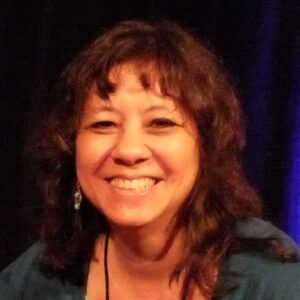Summary
High on engagement, this session will showcase a medley of “kid-tested and teacher-approved” classroom activities that allow students to tap into their place-based knowledge, leverage their cultural capital, and share their geography connections with one another. Participants will engage in a sampler of experiential activities, that foster cultural responsiveness (Multicultural Bingo), build map skills via collaboration (the “ABC’s of . . . ”), and develop geoliteracy skills via personalized learning (Geographize Your Name). Educators will leave this session with “tried and true” classroom-ready lessons that DO solid geography.
Session Focus
Middle School/Junior High | Curriculum and Instruction | Geoliteracy, Place-based, Cultures
Conference Room
Flannigan
Meet the Presenter
 Jeannine Kuropatkin has taught World History, AP Human Geography, World Geography, US History, and Holocaust Studies at the junior high and high school levels for the past 35+ years. She currently teaches World History/Geography and coaches the Model UN Team at Red Mountain High School in Mesa, Arizona. Jeannine has been a long-standing Teacher Consultant with the Arizona Geographic Alliance, received the NCGE K-12 Distinguished Teaching Award, is a three-time recipient of the NCGE Nystrom Award for Exemplary Classroom Lessons and has been published twice in The Geography Teacher. She is currently serving her second term as Vice President of the Arizona Council for the Social Studies, is a former recipient of the ACSS Isadore Starr “Outstanding Social Studies Teacher” Award and has received the ACSS “Great Moments in Teaching” Award on four occasions.
Jeannine Kuropatkin has taught World History, AP Human Geography, World Geography, US History, and Holocaust Studies at the junior high and high school levels for the past 35+ years. She currently teaches World History/Geography and coaches the Model UN Team at Red Mountain High School in Mesa, Arizona. Jeannine has been a long-standing Teacher Consultant with the Arizona Geographic Alliance, received the NCGE K-12 Distinguished Teaching Award, is a three-time recipient of the NCGE Nystrom Award for Exemplary Classroom Lessons and has been published twice in The Geography Teacher. She is currently serving her second term as Vice President of the Arizona Council for the Social Studies, is a former recipient of the ACSS Isadore Starr “Outstanding Social Studies Teacher” Award and has received the ACSS “Great Moments in Teaching” Award on four occasions.
Jeannine had the opportunity to participate in educational study programs and fellowships in Saudi Arabia, Bahrain, Qatar, UAE, Mexico, South Korea, Puerto Rico, and the US Virgin Islands, as well as two Fulbright-Hays Group Projects Abroad in Morocco and Indonesia. She is an education consultant and has written curriculum for The Arizona Geographic Alliance, National Geographic Society Education Foundation, The GeoCivics Project, Japanese American National Museum, and the Fred T. Korematsu Institute.


